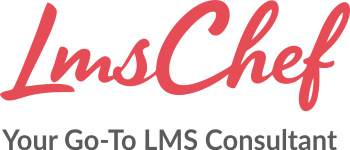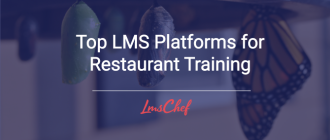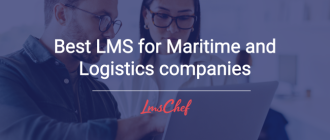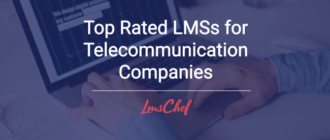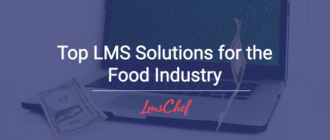Medical professionals like doctors and nurses are expected to continuously update their knowledge and skills and keep abreast of the changing healthcare environment. That’s why many healthcare organizations are considering implementing employee training and often opt for the online format due to its flexibility.
With a learning management system (LMS), they can make workplace training more cost-effective while ensuring quality.
I reviewed 4 top LMS vendors most relevant to healthcare organizations: iSpring, Docebo, EthosCE, and TOPYX. All of them have features that are of essential relevance to the medical industry: learning paths, webinars, advanced analytics and reporting, blended training, and mobile learning. Let’s take a closer look at how these features can be utilized.
- Learning path. This includes a number of courses that users need to take in a certain order. For example, you can combine video, interactive courses, and assessments on emergency medicine or pharmacology to create full programs on these disciplines.
- Webinars. Through video conferencing, you can keep health practitioners up to date on the latest innovations in their field. It’s also possible to record sessions so learners can watch them later.
- Blended learning. All the best healthcare LMSs on the list allow you to manage self-paced learning as well as virtual training sessions and face-to-face events. For example, you can assign theoretical e-courses to learners in the system and, at the same time, use it to plan and track practical classroom lessons.
- Reporting and analytics. In a learning management system, you can monitor the attendance and progress of learners. Training platforms typically come with a great deal of reports related to users, groups, courses, and learning programs.
- Mobile learning. Courses should be accessible and look consistent across different web browsers and mobile devices. Additionally, some platforms have mobile apps for Android and iOS with which learners can take courses and quizzes offline.
Features of a Healthcare Learning Management System
Healthcare LMS platforms may engage clinicians, track their performance, and distribute training content with the help of these tools.
- Multichannel support: Learning materials are made available on desktop, mobile (smartphones and tablets), and cross-platform (iOS, Windows, Android, etc.) platforms by healthcare LMS systems.
- Multiformat content: Thanks to healthcare learning management systems, hospitals can take a multimodal learning approach by enhancing their training and education with eCourses, videos, text, audio, PowerPoint files, PDFs, and more.
- L&D analytics: Hospitals and offices can monitor course completion, onboarding status, compliance completion, and more with a healthcare LMS. With the use of training analytics that can be filtered down to the individual level to view quiz results, certifications, completed courses, and more, an LMS enables healthcare providers to assess the efficacy of their training.
- User management includes adding and deleting users, assigning them responsibilities, organizing them into groups, and giving departments or groups access to learning paths and assignments.
- LMS integrations: To offer contextual, in-app learning experiences, integrate your EHR software, healthcare CRM, and patient portal with third-party tools applications, or create custom add-ons with APIs.
- Customizations: Use a drag-and-drop builder to create learner dashboards and screens.
What Makes a Healthcare LMS Unique vs. a Traditional LMS?
The only differences between healthcare LMSs and regular LMSs are their specialized curricula and regulatory accreditation for disseminating medical knowledge.
Let’s examine the main distinctions between a corporate LMS and a healthcare LMS.
- Availability of a certain medical curriculum
Conventional learning management systems usually lack a comprehensive curriculum tailored to the healthcare industry. These suppliers anticipate that businesses will bring their own materials relevant to their industry. This might be a wise move for hospital networks with the means because you can incorporate specially designed courses built over the years with relatable tales, characters, brands, difficulties, terminologies, and places that your staff will be familiar with.
IBISWorld, an industry market research firm, estimates that the typical American hospital employs 981 people. Most hospitals don’t have enough personnel with that many employees to create and manage sizable internal wikis.
With thousands of courses, tests, videos, animations, and learning paths approved by healthcare authorities, healthcare learning management systems are created with medical companies in mind.
- Adherent educational materials
The medical profession is heavily regulated because authorities want to make sure that doctors follow accepted best practices and minimize hazards, which will improve patient outcomes.
While generalist LMS suppliers don’t go far in creating medical resources, a laborious process that requires certification for distribution, dedicated healthcare LMS systems always possess (and renew) these regulatory accreditations.
Best Healthcare Learning Management System Vendors: Quick Comparison Chart
| LMS | Distinctive features | Helps to |
|---|---|---|
| 1. iSpring Learn |
|
|
| 2. Docebo |
|
|
| 3. EthosCE |
|
|
| 4. TOPYX |
|
|
| 5. TalentLMS |
|
|
Although all the LMSs reviewed have much in common, they have unique features too. Let’s consider each learning management system vendor for healthcare organizations in greater detail.
1. iSpring Learn
Rating: 4.6/5 – 133 reviews (Capterra)
Vendor’s promise: “So much more than a training platform. You got this.”
iSpring Learn is an easy-to-use cloud-based LMS suitable for any healthcare organization with a 30-day free trial. You can start training your employees immediately after registration.
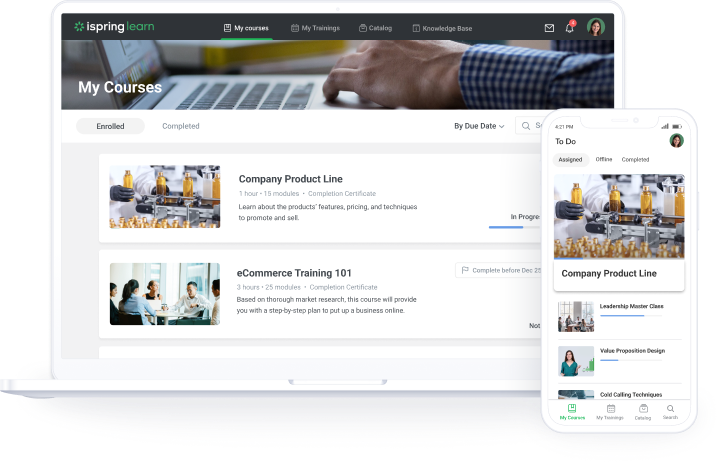
Distinctive features
Users value iSpring Learn’s user-friendly UI. Without specialized instruction, students may easily comprehend how to log in, finish a course or quiz, and receive their results. Additionally, an admin does not need to review the documentation to add users to the system, upload new training materials, or generate reports. An HR specialist, a training manager, or even a medical expert without IT experience can oversee the platform.
Despite their busy schedules, medical professionals can learn anytime, anywhere, with iSpring Learn LMS, the perfect healthcare eLearning solution. With its unique mobile app, users of iPhones and Android devices may learn even more conveniently while on the go.
Considering the diversity of healthcare personnel, you must have an LMS that makes it simple to design various learning paths. Courses designed for physicians, pharmacists, and health tech specialists are not the same as those nurse practitioners need. You may create a fully customizable course catalog for trainees using iSpring Learn.
Get employee training up and running in a single day. Upload educational materials, set up automatic homework, and monitor student progress in real-time. A built-in editor in iSpring Learn allows users to construct page-like courses with quizzes, videos, quotations, and graphics directly within the healthcare learning management system. Technical expertise is not needed; in fact, it’s much simpler than using Word.
Additionally, iSpring Suite, a potent authoring toolkit, is integrated with the learning management system. It enables you to create interactive PowerPoint courses, tests, and role-playing scenarios. Uploading an e-course from the authoring toolkit to the LMS platform only requires a few clicks.
Worldwide, more than 4,000 healthcare companies have selected iSpring Learn. Customers have given it great comments, including decreased training costs, increased staff readiness, and first-rate assistance from the iSpring team.
Pricing
iSpring Learn offers two types of subscription – Start and Business, with Business coming with more advanced features. The price depends on the subscription you choose and the number of learners who enter the platform during a month. For example, the plan for 100 learners/month (Start subscription) costs $2.87 per learner.
Pros
- Microsoft and Zoom integration for in-person meetings
- Makes it easier to certify and recertify to verify knowledge
- Automatic renewal notices that do not require manual labor
- Facilitates self-paced, mobile learning
Cons
- Course authoring tool is incompatible with Mac
- Online video screen recording has some issues (occasional glitches)
- Limited custom user profile fields
- Reporting could be more granular for better progress tracking
2. Docebo
Rating: 4.2/5 — 123 reviews (Capterra)
Vendor’s promise: “All your learning challenges, solved.”
Docebo offers a flexibly customizable LMS with numerous options for medical companies. It allows you to organize not only formal but also informal training in a virtual collaborative environment and combine it with skills management.
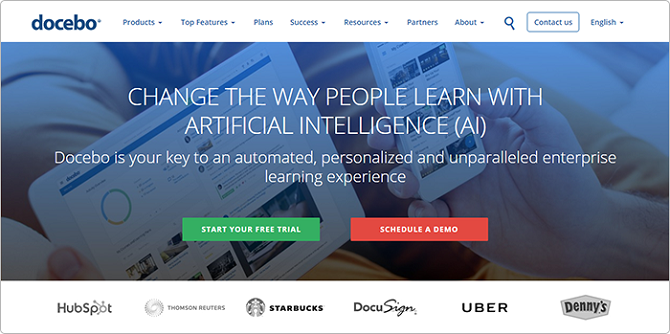
Distinctive features
For medical enterprises, Docebo provides an LMS that is highly customizable and offers a plethora of alternatives. It enables you to plan informal and formal training in a remote collaborative setting and integrate it with skills management.
Docebo provides services to mid-to-large healthcare enterprises that are rapidly expanding or have a huge workforce. Let’s call it a hybrid LMS because, despite not being a healthcare-specific LMS, it does have courses specifically designed for the field in its collection.
Docebo is a good LMS for the healthcare industry if you want the learning management process to be largely automated. It takes great satisfaction to be adaptable to any size and any type of business, especially those in the healthcare sector. Additionally, it assigns role-specific courses to divide departments, making it simple to tailor your training program to the different kinds of healthcare workers in your company.
In addition to building complex healthcare training programs from the ground up, the LMS has a library of pre-made courses. These programs can incorporate blended learning with instructor-led instruction, social learning, and gamification. Its extensive range of integrations is another characteristic that distinguishes it from other healthcare LMSs.
A few considerations for Docebo’s LMS are as follows:
- Support: Docebo provides a manageable email, live chat, and phone support system. They might improve their responsiveness, but for now, it’s better than nothing to have a semi-reliable system where you can report concerns and follow their resolution.
- Pricing: Since their pricing is set, smaller businesses are not a good fit for this; it is aimed at enterprises with 300+ people expanding quickly.
- UX: It has a steep learning curve and is jam-packed with capabilities, especially if this is your first time using an LMS or if any of your staff are not techies.
- Content: Offers over 80,000 courses in its content catalog that you can buy and access on desktop and mobile devices.
Pricing
Public pricing information is unavailable. You’ll need to contact Docebo to obtain current pricing options.
Pros
- Modular system
- Advanced skills management
- Great social learning features
- Wide selection of integrations
- Interesting AI capabilities
Cons
- Non-transparent pricing
3. EthosCE LMS
Rating: 4.8/5 — 3 reviews (G2)
Vendor’s promise: “EthosCE is the leading learning management system (LMS) for medical associations, academic medical centers, health systems, and medical education companies.”
EthosCE is a full-featured hosted learning management system created to automate the delivery of continuing education in nursing, pharmacy, and other healthcare-related professions.
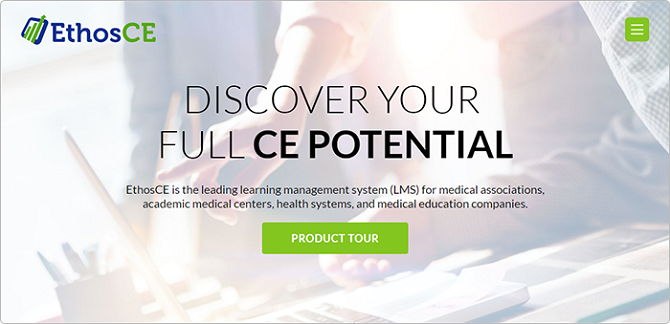
Distinctive features
Developed to automate the delivery of continuing education in nursing, pharmacy, and other healthcare-related professions, EthosCE is a fully functional hosted learning management system. Credit and certification tools are very flexible in EthosCE LMS. With the help of our medical LMS, you can generate multiple credit kinds (such as CE, CME, and CNE) and apply them to individual courses or entire programs across a range of specializations. For every evaluation, you can choose how many credits to award and how long the credits last.
Healthcare businesses can greatly benefit from integration with ACCME web services, which include MOC 2, ABA, ABIM, and ABP programs. It is possible to combine all external credits obtained in the healthcare LMS with credits kept in third-party systems, reducing EthosCE to a single credit repository. Boards and other external systems, such as ACCME PARS, CE Broker, CPE Monitor, and others, receive automatic reports of all data. Working with and integrating several Excel spreadsheets from various platforms is not necessary.
Pricing
Public pricing information is unavailable. You’ll need to contact EthosCE to obtain current pricing.
Pros
- Integration with ACCME web services
- Highly configurable credit and certification tools
- Built-in assessment tool
- Robust analytics
Cons
- Non-transparent pricing
- Clunky interface
- Limited social learning features
4. TOPYX
Rating: 4.2/5 – 16 reviews (Capterra)
Vendor’s promise: “Unlimited Learning, Unlimited Growth”
TOPYX is an LMS system that combines formal and informal learning. It has a full-featured set of tools that allows healthcare industry users to learn at their own pace, collaborate with colleagues, and use different channels for consuming content.
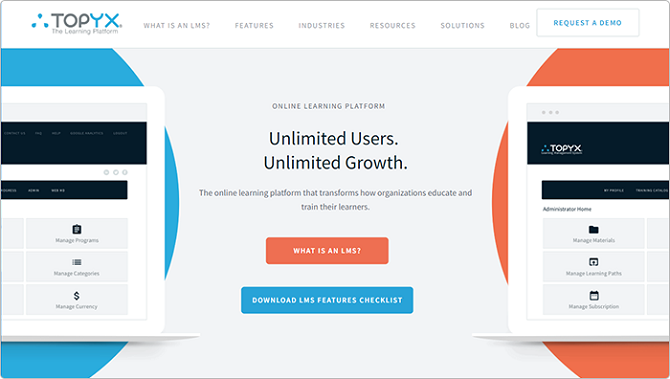
Distinctive features
TOPYX is an LMS system that combines formal and informal learning. Its full-featured set of tools allows healthcare industry users to learn independently, collaborate with colleagues, and consume content through different channels.
TOPYX LMS is a well-liked option for big businesses searching for software for healthcare training. This learning management system has several useful features for the healthcare industry and is ideal for firms operating in quickly evolving industries. For instance, teamwork is fairly typical among healthcare practitioners. For social learning, TOPYX therefore makes chat, blogs, web conferencing, forums, media galleries, etc. possible. Additionally, its “communities” feature will assist you in setting up several learning pathways for the entire team if you’re educating a wide range of departments and tasks.
One of the few healthcare LMS providers that provides a comprehensive learning catalog to get training underway is TOPYX. For instance, pre-made safety and compliance training can be beneficial for your healthcare personnel. Additionally, TOPYX collaborates with Epic, a provider of healthcare education tailored to certain specializations and certifications in the industry.
TOPYX has a lot of social learning potential. You can use it to establish communities centered around any subject or course. The platform has six tiers of social learning communities: course, program, group, site, and material communities and categories. Participating in communities allows students to communicate with one another and exchange knowledge with others. Users can, for instance, share an article about a health subject and utilize the comments section to discuss it with other medical professionals. This functionality accelerates peer-to-peer learning and content curation.
It is also feasible to designate subject-matter experts in TOPYX and assign them to oversee each piece of material. If needed, learners can ask experts questions, and experts can offer helpful training materials. A method like this will aid students in comprehending the various facets of medicine.
This healthcare learning management system also has marketing tiles, sponsor links, media galleries, chats, announcements, calendars, events, and forums.
TOPYX has a wealth of features. However, unlike the other LMSs in the top ranking, it has file download restrictions dependent on the pricing plan. With TOPYX Expanded, you can upload 300 GB of training materials, while with TOPYX Essentials, you can upload just 100 GB.
Pricing
Pricing starts at $6,850/year for up to 500 users.
Pros
- Full set of social learning features
- Ability to create learning paths
- Catalog of healthcare courses
Cons
- No course authoring capabilities
- Upload limitations
5. TalentLMS
Rating: 4.7/5 – 534 reviews (Capterra)
Vendor’s promise: “Unlimited Learning, Unlimited Growth”
TalentLMS is a flexible learning management system designed specifically for the healthcare industry. It offers healthcare organizations a one-stop shop for all training needs, including staff and employee training. TalentLMS, ranked as one of the top healthcare LMSs by the eLearning Industry, provides several features and advantages designed with the healthcare sector in mind.
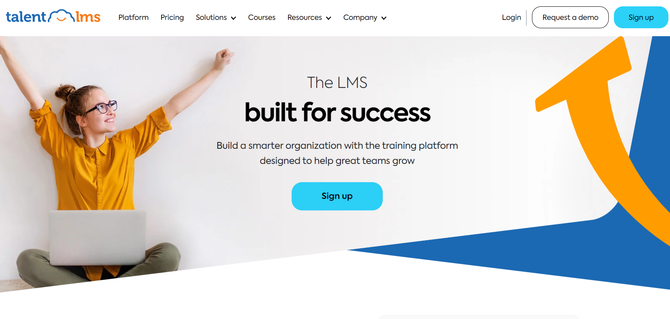
TalentLMS provides strong tools to track and manage compliance needs for healthcare firms that need compliance training. Administrators can use reporting, certifications, and automated reminders to make sure staff members adhere to regulatory requirements.
We were able to switch from pricey in-person seminars to online training using TalentLMS, which drastically decreased expenses and improved team accessibility. We could upload pre-existing training materials for a smooth transition, and the technology lets us develop and modify courses within the system.
Additionally, the technology streamlines the administrative duties related to training management. Healthcare administrators may monitor the progress of their learners, provide compliance reports, and show that their training has been completed by using the platform’s on-demand reports and certificates. Moreover, companies can save time and money on course production by utilizing TalentLibraryTM, a comprehensive library of pre-built courses on hard and soft skills.
Pros
- Fully customizable and easy-to-manage courses
- Mobile readiness for anywhere, anytime learning
- Supports white labeling for branding
- Learning paths to provide guided learning
Cons
- The discussion forum could be improved for better collaboration
- Navigation is slightly complex, especially for the first time users
- Customization is slightly difficult for beginners
- Search for users and courses gets a little complicated
Pricing
Starts at $69/month (billed yearly)
Which LMS is the Easiest to Use?
One of the most user-friendly systems available is iSpring Learn, catering to both front-end and back-end developers. Administrators may create their courses with ease thanks to a user-friendly drag-and-drop interface, industry-specific templates that are ready-made and fully customizable, an extensive resource library, and a helpful customer support team that will walk you through every step. Students, for their part, benefit from an easy-to-use online environment with a clear user interface and seamless navigation.
What are the Benefits of Healthcare LMS?
To ensure uniform and standardized training, a healthcare LMS offers a centralized platform for developing, delivering, and monitoring instructional programs. Healthcare firms can cut expenses related to traditional training techniques, like travel and teacher fees, using Learning Management Systems (LMS).
They provide flexible course delivery, enabling students to access the content whenever it’s most convenient. LMS helps guarantee that regulatory standards are fulfilled and also facilitates compliance training. Organizations may monitor student progress, pinpoint knowledge gaps, and enhance training efficacy by utilizing reporting and analytics tools provided by Learning Management Systems.
How Do I Choose a Healthcare LMS?
Consider the unique training needs of your company when selecting a healthcare LMS, and make sure the system can meet those needs. Seek a system with an intuitive user interface, features that can be customized, and strong content management capabilities. Think about the integration possibilities, interoperability with current systems, and scalability. Examine the security features, such as user authentication and data encryption. Additionally, determine how well the LMS vendor’s training materials and customer service are done. Lastly, consider the cost, including license payments, implementation charges, and continuing maintenance expenditures. Performing a thorough analysis of these variables will assist you in selecting the best healthcare LMS for your business.
Final Thoughts
There are hundreds of healthcare LMSs on the market, and selecting the right solution for medical organizations may prove to be a daunting task. I hope my article will help you shorten the list of platforms that you’ll choose from. Just remember that the best learning management system for healthcare is one that not only empowers healthcare professionals to upskill and grow without distracting from their core responsibilities, but also accounts for the ever-changing nature of the industry.
